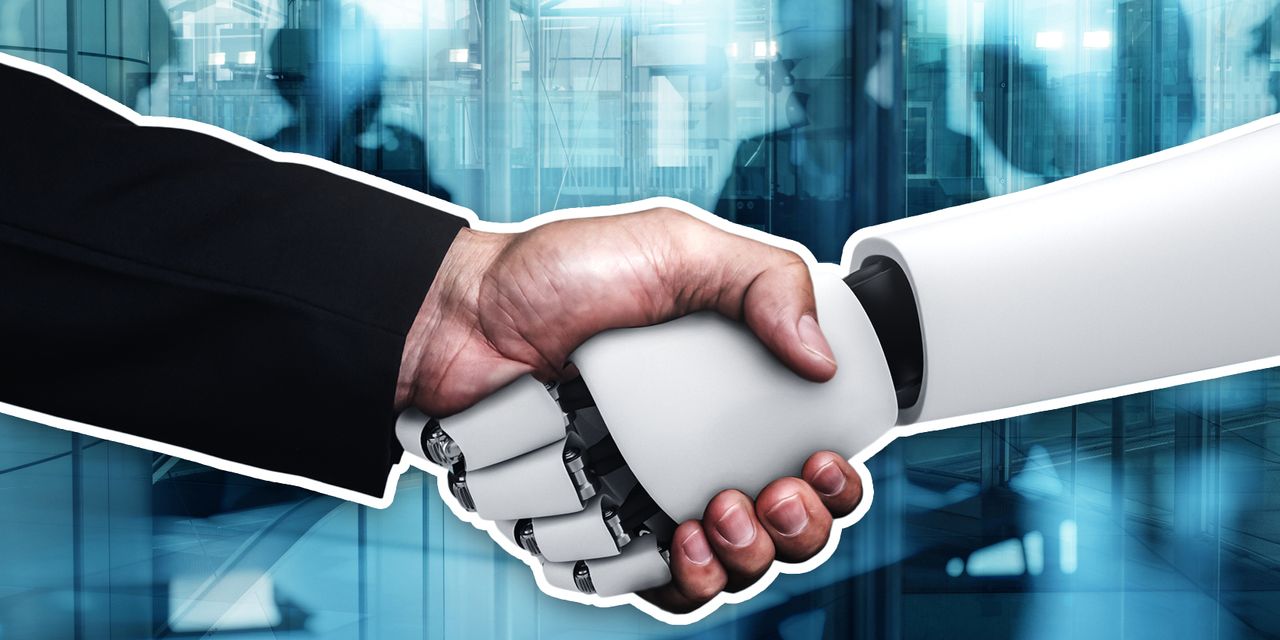A majority of U.S. workers are OK with AI, according to a new survey.
Most Americans in the workforce are not nervously looking over their shoulder at generative artificial intelligence, according to research from accounting firm KPMG. Instead, they’re embracing it as a potential helper that can cut out mundane tasks.
“The latest AI tools feel pretty magical, which is why I think it’s so easy to overhype them and let our imaginations run wild with what they’re capable of,” said Kyle Monson, 44, a former journalist in New York City who runs a midsize marketing agency, Codeword, that has experimented with AI over the past six months. the company “hired” two nonhuman AI interns in January.
“I mostly rely on it for small, helpful tasks such as quick research, a good email,” Monson said. “The reality is much more straightforward, at least for the foreseeable future.”
“Nailing a brand’s tone of voice requires creativity, nuance, emotional intelligence, humor, and, dare I say…human experience?” Kristi Garced, 37, a creative copywriter/editorial director for retail brands in New York, said in an email.
While most workers don’t consider generative AI an immediate threat to their jobs, they do want to learn how to use the technology, according to a survey KPMG conducted with 1,035 white-collar professionals in April and May and released Thursday.
Among those surveyed, 57% don’t think generative AI poses an immediate threat to their jobs, and only 19% are “highly concerned” the technology will make their role “irrelevant.” Meanwhile, 40% feel that they have more than a year before AI endangers their job. Most Americans are eager to learn AI skills on the job, though just 42% rate their company as doing a good or excellent job, KPMG said.
“People are generally optimistic and looking for more upskilling on AI,” Sandy Torchia, KPMG’s vice chair of talent and culture, said in an interview. “They want more training to create content, conduct research and generate code more easily.”
“AI does not replace creativity; it is a tool for us to be more efficient,” said Kevin Frans, chief technology officer at ParagraphAI and formerly of OpenAI. “I trust AI to get rid of menial, annoying work. No one has a provable view of what will happen.”
The results of the poll, along with several other recent surveys in recent months, strongly suggest that a large segment of U.S. workers plans to use AI tools to augment their jobs and eliminate time-wasting, repetitive tasks. That stance runs counter to the fears of a broad swath of U.S. workers, especially those who create content such as in the fields of entertainment and journalism, that AI will eventually replace them.
For more: AI is going to change the way entertainment is made. Will it be for better or worse?
Those fears, as well as those of federal lawmakers, have cast a shadow over the future of AI and the way it may affect jobs, personal data, disinformation and racial stereotyping. Executives from AI leaders such as OpenAI, the Microsoft Corp.-backed
MSFT,
startup behind ChatGPT, Alphabet Inc.’s
GOOGL,
GOOG,
Google, Apple Inc.
AAPL,
and others have vowed to responsibly develop AI to avert any damaging effects.
For now, at least, most white-collar workers don’t seem to be worried.
“The more open-source AI is, the more likely our industry is to be able to access potential donors and write better grant applications, and use it for good,” said Jana Cupp, 35, a certified executive fundraiser in Los Angeles who is excited that AI tools can help expand the work of nonprofit organizations.
Hairstylist Gabby Fishman said she welcomes “the integration of AI in my industry.”
“Instead of feeling threatened, I see a powerful tool that complements my skills and expertise. Folks in the beauty industry have already been contending with these challenges through the use of Photoshop and extreme editing by fellow humans and the industrial-beauty complex,” she said. “What sets us apart as hairstylists is the ability to provide not just a physical transformation, but also interpersonal interactions with our clients.”
This openness to AI among workers is borne out in several polls tracking sentiments toward a technology that is being hyped as world-changing, The reaction may be split among generations, but it remains clear to what extent.
KPMG found millennials (48%) and Gen Zers (44%) were most worried about the role that AI will play in the careers, while Gen Xers (39%) and Boomers (35%) were less worried.
Overall, 38% of full-time workers in the U.S. believe AI will have a positive effect on the workforce, according to a RingCentral Inc.
RNG,
survey of 1,000 people conducted in late January and released last month. However, it found that among U.S. workers ages 21 to 34, 53% said the same, but workers ages 55 to 65 have their doubts: Only 9% said they are excited about using AI at work.
Boomers are least concerned about being replaced by AI (29%), while millennials are the most concerned (18.5%). Over a quarter (27%) of Gen Z is not concerned about being replaced by AI, a Checkr survey found.
Read more: ChatGPT’s Sam Altman: If AI goes wrong, it ‘can go quite wrong’
Another poll from Pew Research Center in April revealed that 62% of Americans think the use of AI in the workplace will have a major effect on workers generally over the next 20 years.
John Blust, 27, who optimizes search-engine performance for web sites, isn’t overly worried, even though the nature of search engines is undergoing significant changes because of AI.
“Generative AI does not have original thought; it can’t create anything new,” Blust said. “It is scraping the internet and giving you an answer that would sound like the right answer.
“When it does create anything new, we’ll worry about that then,” he said.
Read the full article here













